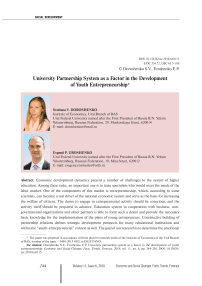University partnership system as a factor in the development of youth entrepreneurship
Автор: Doroshenko Svetlana V., Eroshenko Evgenii P.
Журнал: Economic and Social Changes: Facts, Trends, Forecast @volnc-esc-en
Рубрика: Social development
Статья в выпуске: 6 (60) т.11, 2018 года.
Бесплатный доступ
Economic development dynamics present a number of challenges to the system of higher education. Among these tasks, an important one is to train specialists who would meet the needs of the labor market. One of the components of this market is entrepreneurship, which, according to some scientists, can become a real driver of the national economic system and serve as the basis for increasing the welfare of citizens. The desire to engage in entrepreneurial activity should be conscious, and the activity itself should be prepared in advance. Education system in cooperation with business, non-governmental organizations and other partners is able to form such a desire and provide the necessary basic knowledge for the implementation of the plans of young entrepreneurs. Constructive building of partnership relations defines strategic development prospects for many educational institutions and within the “youth-entrepreneurial” context as well. The goal of our research is to determine the emotional readiness of university students to acquire entrepreneurial skills with participation of university partners...
Youth entrepreneurship, partnerships, university partners
Короткий адрес: https://sciup.org/147224113
IDR: 147224113 | УДК: 334.72 | DOI: 10.15838/esc.2018.6.60.15
Список литературы University partnership system as a factor in the development of youth entrepreneurship
- Global’noe issledovanie zanyatosti i molodezhnogo predprinimatel’stva. Ernst&Young . 2015. Available at: http://www.iblfrussia.org/upload/iblock/109/WEOY2015_JobSurvey_RUS.pdf (accessed June 23, 2018).
- Clemensson M., Christensen J.D. How to Build an Enabling Environment for Youth Entrepreneurship and Sustainable Enterprises. Geneva: International labor office, 2010.
- Chigunta F. Youth Entrepreneurship: Meeting the Key Policy Challenges. Wolfson College; Oxford University (UK), 2002.
- Brister M. How to Support Youth Entrepreneurship. CIPE Development Blog, 2013.
- Saulina Yu.P. Development of entrepreneurial activity in the Russian Federation. Predprinimatel’stvo-XXI=Entrepreneurship-XXI, 2015, no. 7, pp. 128-135..
- Suelda de Albuquerque Ferreira et al. Migration in times of crisis: can entrepreneurship be a solution? The case of Brazilian entrepreneurs in Lisbon (Portugal). Ekonomicheskie i sotsial’nye peremeny: fakty, tendentsii, prognoz=Economic and Social Changes: Facts, Trends, Forecast, 2017, no. 4, vol.10, pp. 242-258. DOI: 10.15838/esc/2017.4.52.14
- Golovina T., Merkulov P., Polyanin A. Strategic vectors of the development of the state support of youth entrepreneurship in Russia. Ekonomicheskaya Politika=Economic Policy, 2017, vol. 12, no. 5, pp. 42-61. DOI: 10.18288/1994-5124-2017-5-03
- Doroshenko S.V., Solomatin Ya.I. The youth factor socio-economic development of the Russian metropolis. Regional’naya ekonomika i upravlenie: elektronnyi nauchnyi zhurnal=Regional Economics and Management: Electronic Scientific Journal, 2015, no. 1, vol. 41, pp. 13-30..
- Doroshenko S.V.Study of relationship and willingness of young people of the Sverdlovsk region to engage in small business. Regional’naya ekonomika i upravlenie: elektronnyi nauchnyi zhurnal=Regional Economics and Management: Electronic Scientific Journal, 2016, no. 4 (48), pp. 206-222..
- Etzkowitz Н. The Triple Helix: University -Industry -Government Innovation in Action. Routledge, 2008. P. 180 DOI: 10.4324/9780203929605
- Dezhina I.G. Features of the Russian "Triple helix" of relations of the state, science and business. Innovatsii=Innovations, 2011, no. 4, pp. 47-55..
- Siegel D.S., Waldmann D., Atwater L.E., Link A. Toward a model of the effective transfer of scientific knowledge from academicians to practitioners: qualitative evidence from the commercialization of university technologies. Journal of Engineering and Technology Management, 2004, no. 21(1/2), p. 42 DOI: 10.1016/j.jengtecman.2003.12.006
- Santoro M., Chakrabarti A.K. Firm Size and Technology Centrality in Industry-University Interactions. Research Policy, 2002, no. 31(7), p. 80 DOI: 10.1016/s0048-7333(01)00190-1
- Gupta A.K., Wilemon D. Changing patterns in industrial R&D management. Journal of Product and Innovation Management, 1996, no. 13(6). 1996. pp. 497-51 DOI: 10.1111/1540-5885.1360497
- Wessner C., Wolff A. Rising to the Challenge: US Innovation Policy for the Global Economy. Washington, D.C.: The National Academies Press. 2012. pp. 110-111 DOI: 10.17226/13386
- Johnson W. The Collaboration Imperative: Universities and Industry as Partners in the 21st Century Knowledge Economy. 2004. Available at: http://sites.nationalacademies.org/cs/groups/pgasite/documents/webpage/pga_051414.pdf (accessed June 24, 2018).
- Baaken T., Schröder C. The Triangle for Innovation in Technology Transfer at University of Applied Sciences. Higher Education Institutions and Innovation in the Knowledge Society, Helsinki, 2008. Pp. 103-116.
- Plewa C., Quester P., Baaken T. Relationship marketing and university-industry linkages: a conceptual framework. Marketing Theory, 2005, vol. 5(4), pp. 433-456 DOI: 10.1177/1470593105058824
- Zinevich O.V., Balmasova T.A. "The third mission" and social engagement of universities. Vlast’=The Authorities, 2015, no 6, pp. 67-72..
- Charles D.R. Universities and Engagement with Cities, Regions and Local Communities. Rebalancing the Social and Economic. Learning. Leicester: NIACE, 2005. Pp. 148-150.
- Perfil’eva O.V. The University in the region: steps towards third mission. Vestnik mezhdunarodnykh organizatsii=International Organisations Research Journal, 2011, no. 1(32), pp. 133-144..
- Reznik G.A., Ponomarenko Yu.S., Kurdova M.A. Functions of the university: new development opportunities. Mir nauki. Pedagogika i psikhologiya=World of Science. Pedagogy and Psychology, 2014, no. 4. Available at: https://mir-nauki.com/PDF/30PMN414.pdf (accessed September 18, 2018)..
- House R., Hanges P., Javidan M., Dorfman P., Gupta V. Culture, Leadership, and Organizations: The GLOBE Study of 62 Societies. Thousand Oaks, CA. Sage Publications, 2004.
- Edwards A. The Social Desirability Variable in Personality Assessment and Research. New York: The Dryden Press, 1957. P. 177.
- Toshchenko Zh.T. Paradoksal’nyi chelovek . Edition 2. Мoscow: YuNITI-DANA, 2008. P. 543.


